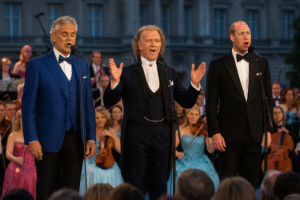As André Rieu conducted his orchestra through a sweeping waltz and Ed Sheeran wrapped his final verse of “Thinking Out Loud,” the lights slowly dimmed. People clapped, expecting the curtain to fall. But instead of a final bow… came silence.
Then, from the side of the stage, a lone figure stepped into the soft spotlight. It was Prince William.
The crowd gasped.
Dressed in classic black tie, nerves visible in his posture but purpose glowing in his eyes, he walked to center stage. André Rieu turned toward him with a gentle nod. Behind them, the orchestra held still — bows raised but not yet moving. Then came William’s voice.
“Tonight isn’t just about music,” he said. “It’s about the moments that stay with us long after the last note fades. This next piece… is for the one I love most.”
From the front row, Catherine, Princess of Wales, froze. Her hands went to her lips, eyes wide.
The orchestra began again — softly, sweetly — and Ed Sheeran returned to the stage, this time without a guitar. Instead, he took the mic and began to sing a never-before-heard melody, composed by Bocelli’s team and arranged by Rieu, blending modern pop with classical grandeur. The lyrics? Co-written by William himself. A love letter in musical form.
As the music swelled, images of William and Kate — dancing at their wedding, laughing with their children, sharing quiet moments away from the cameras — appeared on a screen behind them. The crowd was silent, many clutching tissues, others holding hands.
Kate’s eyes brimmed with tears. By the second verse, she wasn’t alone.
At the climax of the song, Andrea Bocelli stepped forward and added his voice — rich, soaring, sacred. The harmony between Sheeran and Bocelli, paired with the full force of Rieu’s orchestra, lifted the hall into something transcendent. It was no longer a concert. It was devotion set to music.
And then, as the final note lingered in the rafters, William turned once more toward Kate.
He didn’t speak. He didn’t need to.
The expression on his face — raw, unwavering love — said everything.
Kate stood, slowly, her hand still to her heart. The audience erupted, not with roaring applause, but with a kind of stunned reverence. Like something holy had just passed through the room.
Later, backstage, Ed Sheeran was asked why he had interrupted his tour for this one appearance. “Because love like that deserves a soundtrack,” he said.
Andrea Bocelli simply whispered, “It was one of the most beautiful moments I’ve ever sung through.”
The performance was filmed quietly by palace staff, but it wasn’t intended for public release. However, a short clip — just William’s words and the opening line of the song — leaked online. Within hours, it had gone viral. Headlines the next morning read: “A Prince’s Heart on Stage.”
But for those who were in the room that night, no article, no clip, no photo could truly capture it.
It wasn’t just about William and Kate.
It was about how music — when joined with intention, vulnerability, and love — can stop time. Can make thousands of people feel something at once. Can turn even royalty into something achingly human.
And somewhere, in a palace hallway later that night, a wife likely whispered to her husband, “That was the most beautiful thing anyone’s ever done for me.”
To which a Prince — just a man in love — may have replied, “It was always you.”
And the world, watching, quietly fell in love with love all over again.



